|
|
|
Sort Order |
|
|
|
Items / Page
|
|
|
|
|
|
|
| Srl | Item |
| 1 |
ID:
113340
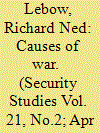

|
|
|
| 2 |
ID:
141968
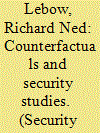

|
|
|
|
|
| Summary/Abstract |
Cause is a cognitive shorthand, not a feature of the world. Context is almost invariably critical in shaping outcomes. For both these reasons, correlations in international relations are weak and all but useless for purposes of explanation and prediction. I develop “inefficient causation” as an alternative approach to explanation and forecasting. It divides the causal problem into two components: reasons actors have for behaving as they do, and the aggregation of the behavior of multiple actors. Both make use of comparative and counterfactual analysis.
|
|
|
|
|
|
|
|
|
|
|
|
|
|
|
|
| 3 |
ID:
100492
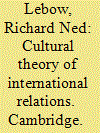

|
|
|
|
|
| Publication |
Cambridge, Cambridge University Press, 2008.
|
| Description |
xi, 762p.
|
| Standard Number |
9780521691888
|
|
|
|
|
|
|
|
|
|
|
|
Copies: C:1/I:0,R:0,Q:0
Circulation
| Accession# | Call# | Current Location | Status | Policy | Location |
| 055507 | 327.101/LEB 055507 | Main | On Shelf | General | |
|
|
|
|
| 4 |
ID:
164832
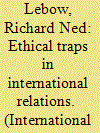

|
|
|
|
|
| Summary/Abstract |
We elaborate a little noticed strategy generally used by weaker actors both in domestic and international politics: the ethical trap. Actors who fall into such traps lose ethical standing and influence at home as well as abroad. We explore the concept of the trap and distinguish it from policy interventions and escalation in which there is no deliberate enticement. We document historical instances of successful ethical trapping both within states and between them. We also discuss traps that were not sprung. We contend that ethical traps have become an increasingly salient feature of contemporary asymmetrical warfare both within states and internationally. We conclude with some propositions about the global practice in which ethical traps are set and the conditions in which they are likely to succeed and some observations about the relative vulnerability of liberal and non-liberal regimes to these traps. This in turn says something important about the practical consequences of ethical violations in international affairs.
|
|
|
|
|
|
|
|
|
|
|
|
|
|
|
|
| 5 |
ID:
069766
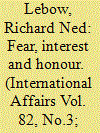

|
|
|
| 6 |
ID:
085422
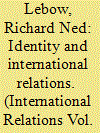

|
|
|
|
|
| Publication |
2008.
|
| Summary/Abstract |
Drawing on Kant and Hegel, debates in political theory and international relations generally assume that an identity cannot be created without the simultaneous creation and negative stereotypy of an `other'. Figures such as Schmitt and Huntington accept and even welcome this binary, while others, among them Nietzsche, Habermas and Rawls, look for ways of overcoming it. Drawing on Homer's Iliad and psychological research, I challenge the assumptions on which Kant and Hegel, and their successors, build their argument.
|
|
|
|
|
|
|
|
|
|
|
|
|
|
|
|
| 7 |
ID:
084129
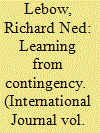

|
|
|
| 8 |
ID:
092037
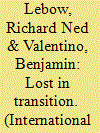

|
|
|
|
|
| Publication |
2009.
|
| Summary/Abstract |
In this paper we identify and critique the key propositions of power transition theory. We find little support for any of power transition theory's main empirical implications. Contrary to most versions of the theory, we fin d that the European and international systems almost never have been characterized by hegemony. No state has achieved a position that allowed it for any extended period to order the international system to suit its interests at the expense of the other major powers. Power transitions are remarkably rare, they seldom occur as the result of differential rates of economic growth, and have most often occurred peacefully. Power transitions are more often the results of wars, rather than the causes of them. Wars between rising and dominant powers are infrequent and are not waged by either side primarily in the effort to defend or revise the international order in their favor. Finally, we find that war rarely resolves the fundamental conflicts of interest caused by power transitions.
|
|
|
|
|
|
|
|
|
|
|
|
|
|
|
|
| 9 |
ID:
039064
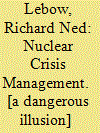

|
|
|
|
|
| Publication |
London, Cornell University Press, 1987.
|
| Description |
226p.
|
| Series |
Cornell studies insecurity affairs
|
| Standard Number |
0801419891
|
|
|
|
|
|
|
|
|
|
|
|
Copies: C:1/I:0,R:0,Q:0
Circulation
| Accession# | Call# | Current Location | Status | Policy | Location |
| 028003 | 355.03/LEB 028003 | Main | On Shelf | General | |
|
|
|
|
| 10 |
ID:
099795
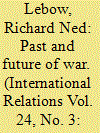

|
|
|
|
|
| Publication |
2010.
|
| Summary/Abstract |
An original data set of wars from 1648 to the present indicates that security and material interest are rarely the principal motives for war for rising, great or dominant powers. These states far more often go to war for reasons of standing. The empirical evidence offers no support for power transition, balance of power, Marxist or rationalist theories of war. The frequency of war between and among rising, great and dominant powers is likely to decline precipitously because the most important motives for war in the past - standing, security, revenge, material interests and domestic politics - are, for the most part, no longer served effectively by war. Changes in ideas, not changes in material conditions, are primarily responsible for this transformation.
|
|
|
|
|
|
|
|
|
|
|
|
|
|
|
|
| 11 |
ID:
001627
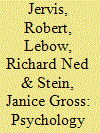

|
|
|
|
|
| Publication |
London, Johns Hopkins University, 1985.
|
| Description |
xx, 270p.
|
| Standard Number |
0801838428
|
|
|
|
|
|
|
|
|
|
|
|
Copies: C:1/I:0,R:0,Q:0
Circulation
| Accession# | Call# | Current Location | Status | Policy | Location |
| 041229 | 355.0217/JER 041229 | Main | On Shelf | General | |
|
|
|
|
| 12 |
ID:
074959
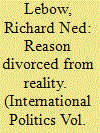

|
|
|
| 13 |
ID:
065732
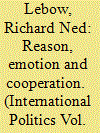

|
|
|
| 14 |
ID:
150491
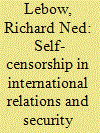

|
|
|
| 15 |
ID:
081154


|
|
|
|
|
| Publication |
Hampshire, Palgrave Macmillan, 2007.
|
| Description |
x, 290p.
|
| Series |
New visions in security
|
| Standard Number |
9781403976611
|
|
|
|
|
|
|
|
|
|
|
|
Copies: C:1/I:0,R:0,Q:0
Circulation
| Accession# | Call# | Current Location | Status | Policy | Location |
| 053265 | 300.1/LEB 053265 | Main | On Shelf | General | |
|
|
|
|
| 16 |
ID:
078244
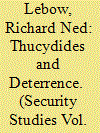

|
|
|
|
|
| Publication |
2007.
|
| Summary/Abstract |
Thucydides describes ten attempts at deterrence and compellence. With one partial exception, the use of these strategies fail and generally help to provoke the behavior they were meant to prevent. The narrative and speeches in Thucydides' text indicate that leaders everywhere rely on deterrence and compellence and expect them to succeed. Targets of these strategies nevertheless downplay risks and costs when it is contrary to their desires or needs. When motivated by appetite, actors not infrequently indulge in wishful thinking. When motivated by honor, actors are risk accepting and may welcome threats as a means of demonstrating their courage. When motivated by fear, actors worry about the consequences of compliance, which they reason may be more costly than resistance. Thucydides is the first person to frame deterrence and compellence as a strategic interaction problem and to emphasize the determining importance of motives for the strategic calculus of actors. His analysis has important implications for contemporary conflict management
|
|
|
|
|
|
|
|
|
|
|
|
|
|
|
|
| 17 |
ID:
049908
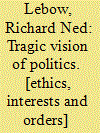

|
|
|
|
|
| Publication |
Cambridge, Cambridge University Press, 2003.
|
| Description |
xvii, 405p.
|
| Standard Number |
9780521534857
|
|
|
|
|
|
|
|
|
|
|
|
Copies: C:1/I:0,R:0,Q:0
Circulation
| Accession# | Call# | Current Location | Status | Policy | Location |
| 047364 | 172.4/LEB 047364 | Main | On Shelf | General | |
|
|
|
|
| 18 |
ID:
137092
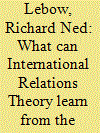

|
|
|
|
|
| Summary/Abstract |
World War I is a foundational or critical case for theories of international relations that address the causes of war. They include balance of power, deterrence, power transition theory, and rationalist models of decision making. Recent historical work on the underlying and immediate causes of World War I raises serious problems for all these approaches. Among other things, they highlight the importance of context, how it is understood by leaders, their motives and assumptions, and their tendency to exaggerate the constraints acting on them, the freedom of other actors, and their ability to predict events and control risks.
|
|
|
|
|
|
|
|
|
|
|
|
|
|
|
|
| 19 |
ID:
101543
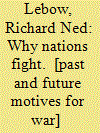

|
|
|
|
|
| Publication |
Cambridge, Cambridge University Press, 2010.
|
| Description |
xii, 295p.
|
| Standard Number |
978052117045
|
|
|
|
|
|
|
|
|
|
|
|
Copies: C:1/I:0,R:0,Q:0
Circulation
| Accession# | Call# | Current Location | Status | Policy | Location |
| 055589 | 355.027/LEB 055589 | Main | On Shelf | General | |
|
|
|
|
|
|
|
|
|